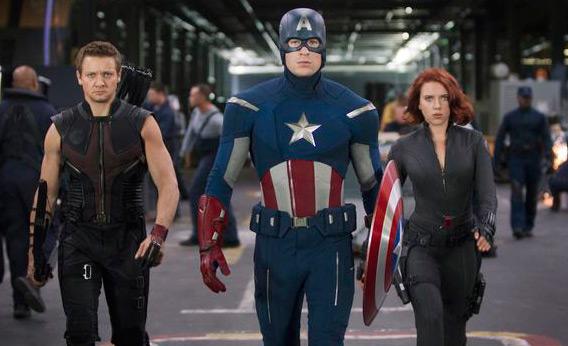The Avengers
It’s like a corporate retreat for superheroes.

Still by Zade Rosenthal/Marvel Studios/Paramount Pictures.
After you've seen The Avengers, come back and listen to our Spoiler Special discussion of all the tasty tidbits:
You can also click here to download the MP3 file, or you'll find this and dozens of other Spoiler Specials in our iTunes podcast feed here.
“The tesseract has awakened,” intones a James Earl Jones-by-way-of-Jeremy-Irons voice-over in the opening moments of Joss Whedon’s superhero hoedown The Avengers (Disney/Marvel). In the opening scene, the object in question, a small yet infinitely powerful bluish-white cube, single-handedly destroys a vast top-secret government laboratory known as the Dark Energy Division (which, before it imploded, must have been a cool place to say you worked. I may print up business cards with “Dark Energy Division” below my name).
A tesseract awakened in my mind during those opening frames too, a portal to another dimension in which I’d already seen this movie, which in turn led to an infinite regression of universes in which I’d also already seen it. As a viewer, I might just qualify myself as tired of the chokehold the comic-book blockbuster has on our culture; as a critic, I’m starting to feel something akin to defeated by it. If guys in tights and capes must dominate our summer movie screens until we’re all pushing walkers into the multiplex, I guess I’ll resign myself to watching—but what on earth is there left to say about them?
Because The Avengers is directed and co-written by Whedon, the quick-witted pop mythologist most famous for creating TV’s Buffy the Vampire Slayer, and because the cast includes a few actors known more for brains than brawn (Jeremy Renner, Mark Ruffalo, Robert Downey Jr.), it does manage to feel a cut above the average superhero movie, with the odd clever sight gag or sharp bit of banter. But there’s only so much Whedon can do to make The Avengers his own; helming a project this size, with a budget that makes global success an absolute necessity, must be like docking an aircraft carrier.
In fact, an aircraft carrier of sorts—a vast floating military base with the ability to make itself invisible—provides the setting for much of The Avengers. There, Nick Fury (Samuel L. Jackson) a kind of superhero head-hunter, gathers together his band of differently abled world-savers. Some, like Iron Man (Downey), Captain America (Chris Evans) and the Hulk (Ruffalo), are mortal men who’ve gained extraordinary powers either through an accident of fate or the force of their own will. Others, like the Black Widow (Scarlett Johansson) and Hawkeye (Jeremy Renner) are more like super-spies than superheroes, black-ops specialists with highly developed fighting skills but no special powers. And at least one, Thor (Chris Hemsworth) is a demigod from outer space. The same goes for Thor’s brother Loki (Tom Hiddleston), who, as the movie begins, escapes from exile to come to earth and enslave all humanity, for no other reason than he feels like it.
The capriciousness of Loki’s motivation—in one scene, he forces a crowd of German opera-goers to kneel before him, just to prove that mankind’s belief in freedom is only an illusion—makes him an appealingly mercurial villain, greeting the chaos he wreaks not with a doomy glower but with an almost mischievous smile. Each of the Avengers, too, gets his or her small moments of character development. Iron Man’s self-satisfied alter ego Tony Stark must overcome his narcissism to serve the larger cause; Thor must get over his snobbish reluctance to fight alongside mere mortals; and, in the best-drawn character arc, Bruce Banner, aka the Hulk, must come to terms with his inner green rage monster, whom he refers to only obliquely as “the other guy.”
Above, I called The Avengers a “superhero hoedown”; it might more accurately be described as the opening-night cocktail party at a corporate superhero retreat. There’s a lot of competitive wisecracking and jockeying for status among the assembled luminaries. Some of this dialogue, especially in the scenes of pseudoscientific one-upmanship between Tony Stark and Bruce Banner, is quite funny (though a completely nonverbal moment between Hulk and Thor provides the movie’s biggest laugh, which I won’t spoil here). And the actors playing the Avengers (as well as some of their non-super helpmates, including Gwyneth Paltrow as Iron Man’s lady friend Pepper Potts and Clark Gregg as the loyal Agent Coulson) are such charismatic company that it comes as something of a disappointment each time the kibitzing gives way to crime-fighting, with long breaks for spectacular (and often spectacularly dull) CGI-enhanced action set pieces, including the climactic invasion of New York City by semi-organic robot reptiles.
Because it pulls off the tricky feat of combining multiple pre-existing Marvel franchises into a reasonably entertaining and tonally coherent whole, The Avengers (which has already set the machinery in place for its sequel with an end-credits teaser) will likely be hailed as a kind of thinking fan’s superhero film, the way Whedon’s recent Cabin in the Woods functioned as both a horror movie and a critique of same. But a colossally scaled blockbuster like The Avengers lacks both the agility and the motivation to question its reason for existence. Its primary purpose is not to explore or subvert the superhero movie, but to lay the groundwork for more of them (Ruffalo, who arguably steals the movie as the rumpled, reluctant Banner/Hulk, has just signed on for a six-movie deal.) The tesseract crisis may have been resolved by the end of The Avengers, but rest assured the time-space portal will be opening again by the summer of 2013, sucking viewers into theaters with the inexorable force of a black hole.
